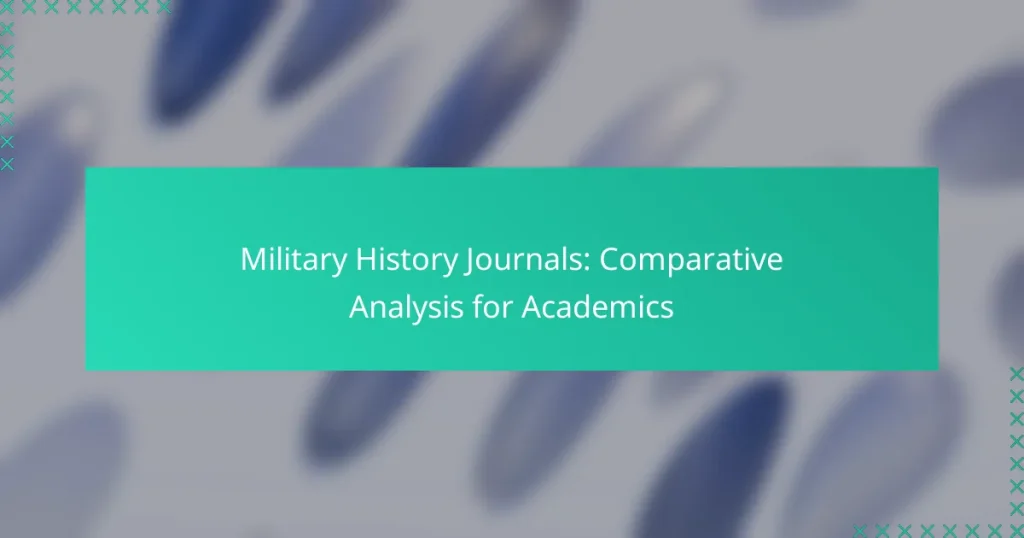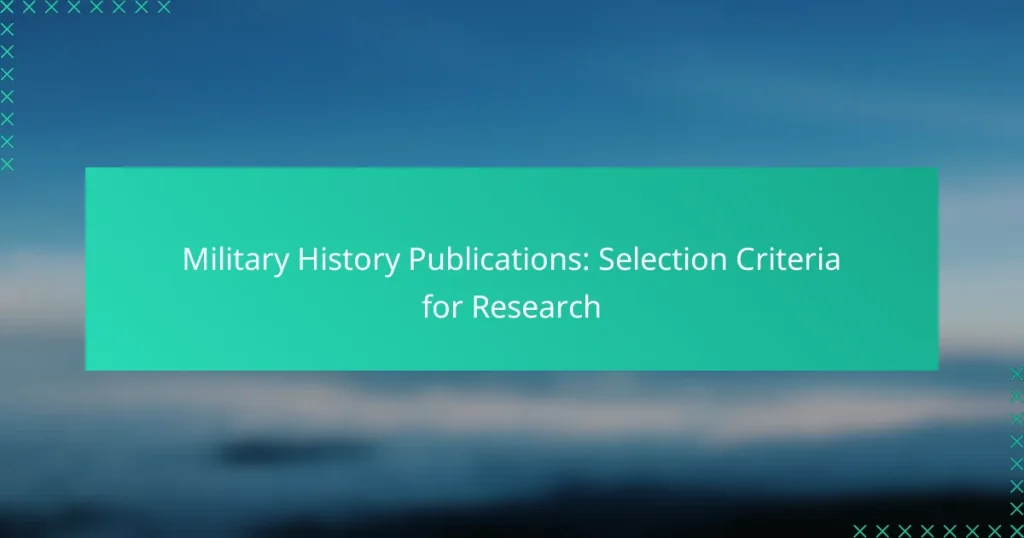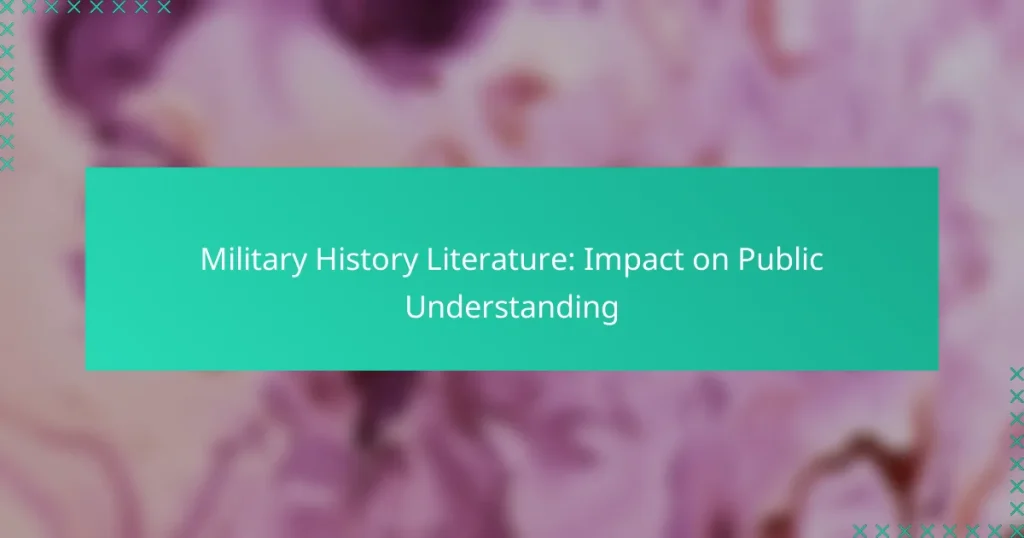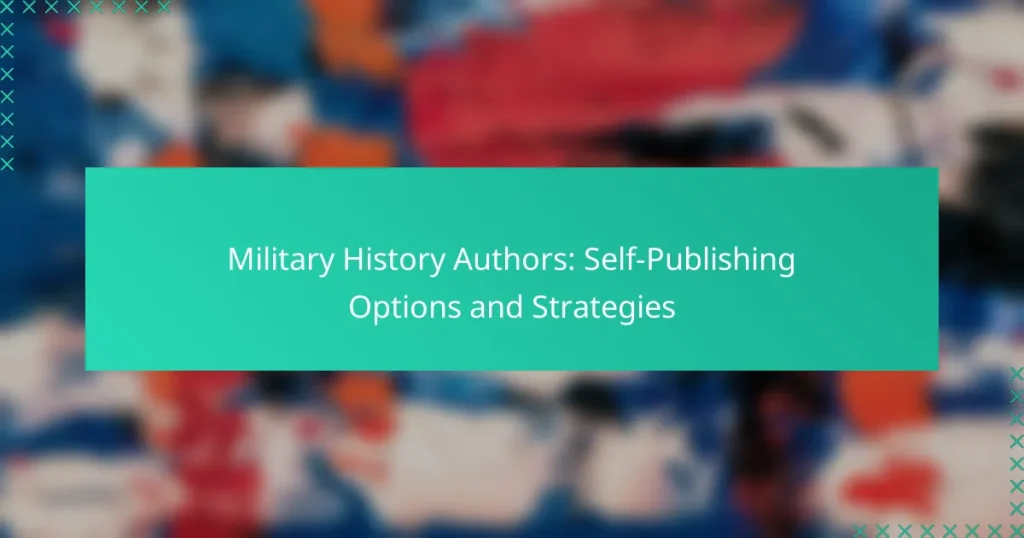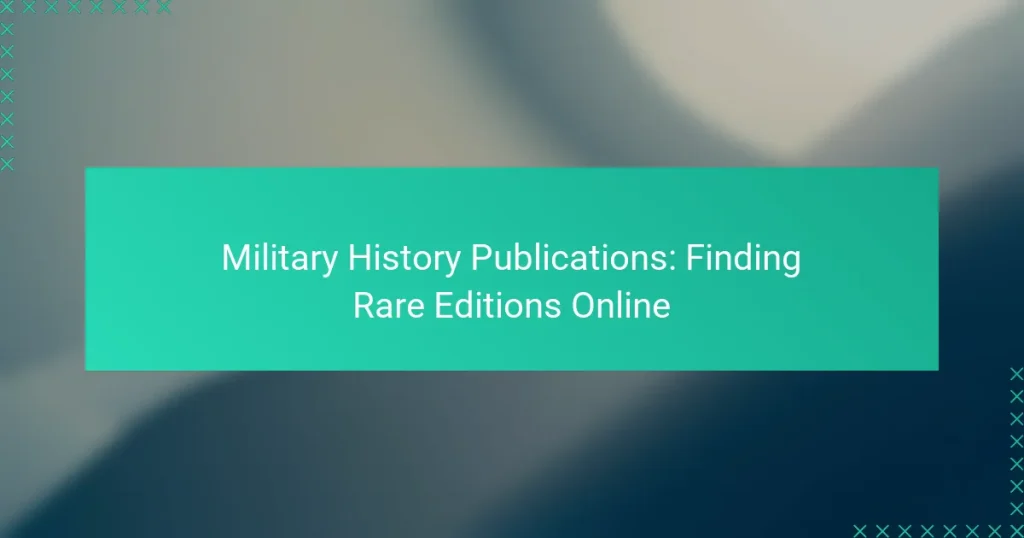Military history resources encompass a wide range of books and publications that delve into the complexities of warfare and its societal impacts. These works provide valuable insights into significant battles, strategic theories, and the historical context of military actions. Accessible through various platforms, including online bookstores and specialized journals, these resources cater to diverse interests and needs in the field of military history.
Military History Publications: Selection Criteria for Research
Military History Literature: Impact on Public Understanding
Military History Books: Essential Reads for Enthusiasts
Military History Books: Budget-Friendly Options for Casual Readers
Military History Authors: Self-Publishing Options and Strategies
Military History Publications: Finding Rare Editions Online
What are the best military history books?
The best military history books provide in-depth analysis, compelling narratives, and critical insights into warfare and its impact on society. These works often cover significant battles, strategic theories, and the broader implications of military actions throughout history.
“The Face of Battle” by John Keegan
In “The Face of Battle,” John Keegan revolutionizes the study of military history by focusing on the experience of soldiers in combat rather than just the strategies of generals. He examines three pivotal battles—Agincourt, Waterloo, and the Somme—providing a vivid portrayal of the realities of warfare.
This book emphasizes the chaos and confusion of battle, challenging traditional narratives that often glorify military leaders. Keegan’s approach encourages readers to appreciate the human element of war, making it a must-read for those interested in the personal experiences of soldiers.
“On War” by Carl von Clausewitz
“On War” is a seminal work by military theorist Carl von Clausewitz that explores the philosophical and strategic aspects of warfare. Written in the early 19th century, it remains relevant today for its insights into the nature of conflict and the relationship between war and politics.
Clausewitz introduces key concepts such as the “fog of war” and the “culminating point of victory,” which are essential for understanding military strategy. This book is particularly valuable for military professionals and scholars seeking to grasp the complexities of warfare.
“The Second World War” by Sir Winston Churchill
Sir Winston Churchill’s “The Second World War” is an extensive six-volume account of the global conflict from a leader’s perspective. Churchill provides a detailed narrative of the war’s events, strategies, and key figures, drawing on his experiences as Prime Minister during this tumultuous period.
This work is notable for its firsthand insights and Churchill’s unique ability to convey the gravity of the situation. Readers gain a comprehensive understanding of the war’s progression and the decisions that shaped its outcome, making it essential for anyone studying World War II.
“A History of Warfare” by John Keegan
In “A History of Warfare,” John Keegan examines the evolution of warfare from ancient times to the modern era, focusing on the cultural and social contexts that shape military practices. He argues that warfare is not just a series of battles but a reflection of societal values and structures.
This book encourages readers to consider how different cultures approach conflict and the implications of these approaches on global history. Keegan’s analysis provides a broader understanding of warfare’s role in human civilization, making it a significant contribution to military history literature.
“The Guns of August” by Barbara W. Tuchman
Barbara W. Tuchman’s “The Guns of August” chronicles the events leading up to World War I, focusing on the first month of the conflict. Tuchman’s narrative style combines thorough research with engaging storytelling, making complex historical events accessible to a wide audience.
This book highlights the miscalculations and decisions that led to the war, emphasizing the impact of leadership and diplomacy. Tuchman’s work is essential for understanding the origins of World War I and the factors that contributed to its escalation, providing valuable lessons for contemporary readers.
Where can I find military history publications?
You can find military history publications in various places, including online bookstores, university libraries, specialized journals, and niche bookstores. Each option offers unique advantages, catering to different preferences and needs for accessing military history literature.
Online bookstores like Amazon
Online bookstores such as Amazon provide a vast selection of military history publications, ranging from classic texts to the latest releases. You can easily search for specific titles or browse categories to discover new authors and topics.
Consider checking customer reviews and ratings to gauge the quality of the books. Many online retailers also offer e-books, which can be a cost-effective option for readers looking to save space or money.
University libraries
University libraries often have extensive collections of military history publications, including rare and academic texts. If you are a student or affiliated with a university, you may have free access to these resources.
Even if you are not a student, many libraries allow public access to their collections. You can often request interlibrary loans for books not available at your local library, expanding your options significantly.
Military history journals
Military history journals publish scholarly articles and research on various aspects of military history. Subscribing to these journals can keep you informed about the latest academic discussions and findings in the field.
Some well-known journals include “The Journal of Military History” and “War in History.” Many of these publications are available online, making it easy to access articles from anywhere.
Specialty bookstores
Specialty bookstores focusing on military history often carry unique titles and local publications that mainstream retailers may not stock. These stores can be great places to find niche topics or rare editions.
Visiting a specialty bookstore can also provide an opportunity to speak with knowledgeable staff who can recommend books based on your interests. Consider checking for events or book signings that may enhance your experience and knowledge of military history.
How do I choose military history resources?
Choosing military history resources involves evaluating the author’s expertise, the publication date, and the presence of peer reviews. These factors help ensure that the materials are credible, relevant, and well-regarded in the field.
Consider author expertise
When selecting military history resources, the author’s background is crucial. Look for authors with academic credentials, military experience, or a strong publication record in military studies. An author with a PhD in history or a retired military officer may provide deeper insights than a generalist writer.
Additionally, consider the author’s previous works. If they have published extensively on specific conflicts or themes, their expertise can enhance the quality of the resource. Researching their affiliations with reputable institutions can also indicate their credibility.
Check publication date
The publication date of military history resources can significantly affect their relevance. Recent publications may incorporate the latest research, interpretations, and historiographical debates, while older works might lack contemporary perspectives. Aim for resources published within the last decade for the most current insights.
However, classic texts can still hold value, especially if they are foundational works in military history. Balancing newer resources with established classics can provide a comprehensive understanding of the subject.
Look for peer reviews
Peer reviews are a strong indicator of the quality and reliability of military history resources. Resources that have undergone peer review are typically scrutinized by experts in the field, ensuring that the content is accurate and well-supported. Look for reviews in academic journals or reputable publications.
Additionally, consider reader reviews and ratings on platforms like Goodreads or Amazon. While these are not as rigorous as academic peer reviews, they can provide insight into how the broader audience perceives the resource’s quality and usefulness.
What are the key military history journals?
Key military history journals provide critical insights, research, and discussions on various aspects of military history. They serve as platforms for scholars and enthusiasts to explore historical events, strategies, and the impact of warfare on society.
The Journal of Military History
The Journal of Military History is a leading publication that focuses on the study of military history across different periods and regions. It features peer-reviewed articles, book reviews, and essays that contribute to the understanding of military operations, strategies, and their broader implications.
Readers can expect a diverse range of topics, from ancient warfare to modern conflicts, often emphasizing the social, political, and cultural contexts of military actions. Submissions are rigorously vetted, ensuring high-quality scholarship.
Military Affairs
Military Affairs is another significant journal that addresses contemporary military issues and historical perspectives. It aims to bridge the gap between military history and current military practices, providing insights that are relevant to both scholars and practitioners.
This journal often includes articles that analyze military policy, strategy, and the evolution of armed forces. It is a valuable resource for those interested in the intersection of history and modern military operations.
War in History
War in History focuses on the historical analysis of warfare, exploring its causes, conduct, and consequences. This journal is known for its interdisciplinary approach, integrating perspectives from history, sociology, and political science.
Contributors often examine case studies and thematic issues, making it a rich source for understanding the complexities of war. The journal encourages innovative research that challenges traditional narratives and offers fresh insights into historical conflicts.
What are emerging trends in military history research?
Emerging trends in military history research emphasize new methodologies and perspectives that broaden traditional narratives. Researchers are increasingly integrating social history, digital tools, and interdisciplinary approaches to enhance understanding of military events and their impacts.
Increased focus on social history
The increased focus on social history in military studies examines the experiences of individuals and communities affected by conflict, rather than solely the actions of military leaders. This perspective highlights the roles of gender, class, and ethnicity in shaping military experiences and outcomes.
For example, studies may explore how women contributed to war efforts on the home front or how marginalized groups experienced conscription and combat differently. This approach enriches the narrative by providing a more inclusive understanding of military history.
Digital humanities in military studies
Digital humanities are transforming military history research by utilizing technology to analyze and visualize data. Tools such as GIS mapping and digital archives allow historians to uncover patterns and connections that traditional methods might overlook.
Researchers can create interactive maps that illustrate troop movements or analyze large datasets to identify trends in military engagements. These digital resources make military history more accessible and engaging for both scholars and the public.
Interdisciplinary approaches
Interdisciplinary approaches in military history research combine insights from various fields, such as sociology, anthropology, and political science. This collaboration fosters a more comprehensive understanding of military conflicts and their broader implications.
For instance, incorporating psychological studies can shed light on the mental health impacts of warfare on soldiers and civilians. By drawing from diverse disciplines, researchers can develop richer, more nuanced interpretations of military events and their legacies.
How is military history taught in schools?
Military history is often taught in schools through a combination of dedicated courses and integration into broader history curricula. This approach helps students understand the impact of military events on society, politics, and culture.
Curriculum Focus
The curriculum for military history typically emphasizes significant wars, battles, and military leaders, along with the socio-political contexts surrounding these events. Students may study various conflicts, such as World War I, World War II, and the Cold War, analyzing their causes and consequences.
In many cases, educators use primary sources, such as letters, diaries, and official documents, to provide students with firsthand perspectives on military events. This method encourages critical thinking and helps students connect historical events to contemporary issues.
Teaching Methods
Teaching methods for military history can vary widely, incorporating lectures, discussions, multimedia presentations, and simulations. Educators often utilize films, documentaries, and interactive activities to engage students and enhance their understanding of complex topics.
Group projects and debates are common, allowing students to explore different viewpoints and develop their analytical skills. Field trips to battlefields or military museums can also enrich the learning experience by providing tangible connections to the material.
Assessment Strategies
Assessment in military history courses typically includes a mix of written assignments, presentations, and exams. Educators may evaluate students’ understanding through essays that require them to analyze historical events and their implications.
Projects that involve research and critical analysis of military strategies or the impact of warfare on society are also common. These assessments help ensure that students grasp both the factual content and the broader significance of military history.
